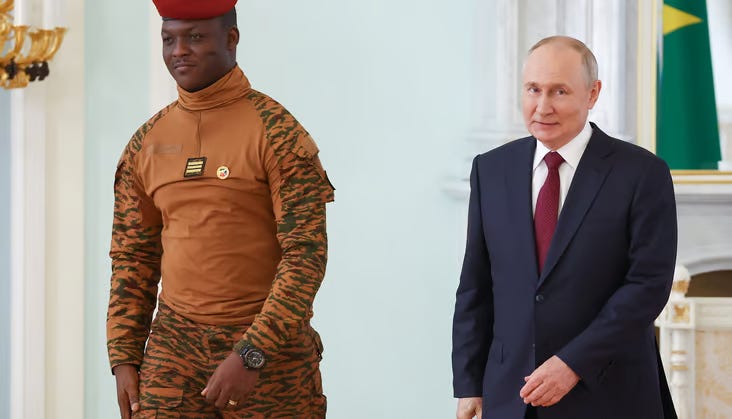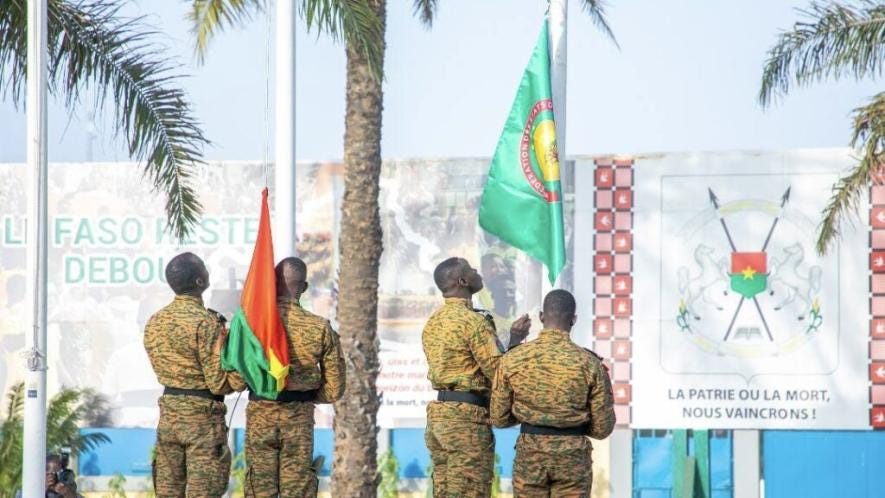Reclaiming Sovereignty: The Sahel Alliance's Defiant March from Colonial Shadows
How Centuries of Exploitation, Coups, and Western Interference Fuel a New Era of Pan-African Solidarity.
Introduction: A New Flag Rises in the Sahel
On March 5, 2025, the Sahel Alliance—a bloc comprising Mali, Burkina Faso, and Niger—unveiled a new flag, symbolizing a bold stride toward regional integration. This act transcends mere symbolism; it embodies a collective rejection of colonial legacies and Western dominance. The tricolor, infused with Pan-African hues, signals a transformative shift in a region long exploited for its resources and destabilized by foreign intervention. To understand this moment, one must traverse centuries of colonial plunder, Cold War-era coups, and neoliberal exploitation that have shaped the Sahel’s turbulent journey
Traoré: Africa Will Be Self-sufficient, Sovereign, Independent.
Colonial Roots: Extraction and Divide-and-Rule
The Sahel’s modern crises are inextricably linked to European colonialism. France, the dominant colonial power, carved the region into arbitrary territories under French West Africa, prioritizing resource extraction over development. Niger’s uranium—critical for France’s nuclear energy—was mined by firms like Areva (now Orano) with minimal local benefit. Mali’s gold and agricultural wealth fueled French industries, while infrastructure investments served colonial logistics, not Sahelian communities.
Colonial administrators entrenched ethnic divisions, pitting groups against each other to stifle unity. Post-independence in the 1960s, these artificial borders and fragmented societies became tinderboxes for future conflict.
Neocolonialism and the Coup Cycle
Formal independence did not end foreign domination. France retained economic control through the CFA franc, a colonial currency pegged to the French treasury that stifled monetary sovereignty. The World Bank and IMF’s structural adjustment programs in the 1980s and 1990s forced austerity, privatized public assets, and dismantled social services, deepening poverty.
Political instability followed. During the Cold War, Western powers backed authoritarian regimes to secure resources and counter Soviet influence. Coups became a recurring feature, often orchestrated or tacitly supported by external actors. For instance, France’s covert operations in the 1960s and 1970s removed leaders like Modibo Keïta of Mali, who sought economic autonomy.
The War on Terror and Exploitation’s New Face
The 21st century saw the Sahel become a battleground for the U.S.-led War on Terror. After Libya’s 2011 NATO-led collapse, weapons flooded the region, empowering jihadist groups. France launched Operation Barkhane in 2014, ostensibly to combat terrorism, but its 5,000 troops failed to curb violence. Instead, civilian casualties and cultural insensitivity—such as French soldiers occupying schools—sparked outrage.
Meanwhile, resource extraction continued unabated. Niger, supplying 30% of France’s uranium, saw 70% of its population live on under $2 a day. Protests erupted in 2023 when Orano blocked Niger from selling uranium to others at market rates. “We are rich in resources but condemned to poverty,” lamented a Niamey activist.
Coups as Rejection: The 2020s Revolt
The 2020s marked a turning point. Between 2020 and 2023, Mali, Burkina Faso, and Niger experienced coups led by military officers who framed their actions as revolutions against Western puppetry. In Mali, Colonel Assimi Goïta condemned France’s “failure and arrogance.” Burkina Faso’s Captain Ibrahim Traore accused Paris of “plundering our gold while we die from terror.”
These coups enjoyed rare public support. Streets echoed with cries of “Down with France!” as crowds waved Russian flags—a stark symbol of shifting alliances. The Wagner Group’s arrival, despite controversies, underscored a preference for non-Western partners who offered military aid without overt political strings
The Sahel Alliance: Integration Against All Odds
Expelling French troops and rejecting the CFA franc, the tri-nation Alliance of Sahel States emerged in 2023. Its ambitious agenda includes a joint security force, shared currency, and infrastructure projects. The new flag, unveiled in 2025, epitomizes this vision: green for agricultural revival, gold for resource sovereignty, and black for collective resilience.
The bloc defies ECOWAS, the West African union that sanctioned the coup states under Western pressure. By partnering with Russia, Turkey, and regional allies like Guinea, the Alliance seeks to redefine Sahelian geopolitics. Challenges loom—jihadist threats persist, and economic sanctions bite—but the bloc’s defiance resonates across Africa.

Conclusion: A Decolonial Dawn?
The Sahel Alliance’s rise is more than a regional realignment; it is a microcosm of Africa’s broader struggle against neocolonialism. As historian Amadou Hampâté Bâ once said, “In Africa, when an elder dies, a library burns.” Today, the Sahel’s youth are writing a new chapter—one where libraries are rebuilt on foundations of sovereignty, solidarity, and self-determination. The road ahead is fraught, but the flag flies as a testament to a region determined to chart its course.
Implications and Global Resonance
The Sahel’s defiance has reverberated globally. European powers fear losing control over critical minerals amid the green energy transition. Meanwhile, Global South nations watch closely, seeing the Sahel as a litmus test for post-Western multilateralism. As the Alliance strengthens, it challenges the world to confront colonialism’s enduring scars—and recognize Africa’s agency in healing them. The hope of total sovereignty of the African continent lies in more countries taking steps like the AES countries in rejuvinating the movement for pan-Africanism. Considering Niger has become the fastest growing economy since it ejected France and pro-AES coup, the prospect of controlling their own resources without the exploitative grubby interests of Western powers can be alluring.
Sources: People’s Dispatch, Africa Stream, RT.








Absolutely encouraging and inspiring. May this mentality expand exponentially on the Continent! Thank you Nouri......
https://thetricontinental.org/wp-content/uploads/2024/10/ink000021_interventions-5_a-new-world_e-book.pdf
I encourage you to read my analysis of the AES, written throughout 2024 and published in October of that year. I focus on the concepts of ‘army’ and ‘nation’ and ‘class’ as fundamental to understanding the patriotic, anti-colonial struggle occurring in the Sahel.